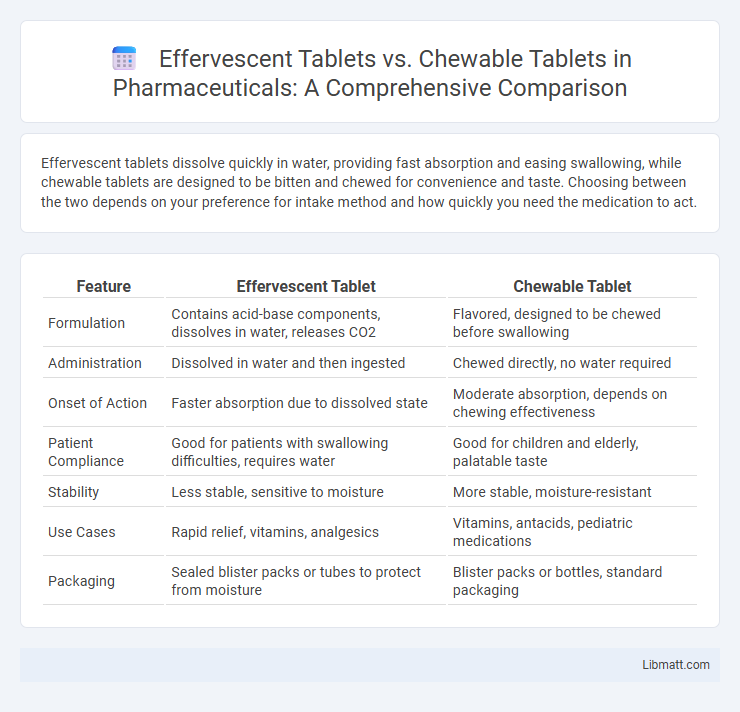Effervescent tablets dissolve quickly in water, providing fast absorption and easing swallowing, while chewable tablets are designed to be bitten and chewed for convenience and taste. Choosing between the two depends on your preference for intake method and how quickly you need the medication to act.
Table of Comparison
| Feature | Effervescent Tablet | Chewable Tablet |
|---|---|---|
| Formulation | Contains acid-base components, dissolves in water, releases CO2 | Flavored, designed to be chewed before swallowing |
| Administration | Dissolved in water and then ingested | Chewed directly, no water required |
| Onset of Action | Faster absorption due to dissolved state | Moderate absorption, depends on chewing effectiveness |
| Patient Compliance | Good for patients with swallowing difficulties, requires water | Good for children and elderly, palatable taste |
| Stability | Less stable, sensitive to moisture | More stable, moisture-resistant |
| Use Cases | Rapid relief, vitamins, analgesics | Vitamins, antacids, pediatric medications |
| Packaging | Sealed blister packs or tubes to protect from moisture | Blister packs or bottles, standard packaging |
Introduction to Effervescent and Chewable Tablets
Effervescent tablets dissolve in water, releasing carbon dioxide and creating a fizzy solution that enhances rapid absorption of active ingredients. Chewable tablets are designed to be chewed before swallowing, providing convenience and ease of ingestion, especially for those with difficulty swallowing pills. Your choice between effervescent and chewable tablets depends on preferences for taste, speed of absorption, and ease of use.
Key Differences in Formulation
Effervescent tablets contain active ingredients combined with acids and carbonates, which react with water to produce bubbles, enhancing rapid dissolution and absorption. Chewable tablets are formulated with binders and sweeteners to create a pleasant taste and texture, allowing them to be ingested without water. Your choice depends on preference for fast absorption with effervescents or convenience and palatability with chewables.
Mechanisms of Action
Effervescent tablets dissolve in water, releasing carbon dioxide gas that enhances drug absorption through rapid disintegration and increased solubility. Chewable tablets rely on mechanical breakdown in the mouth, allowing enzymes in saliva to begin digestion and facilitate faster absorption via mucosal membranes. Both forms optimize drug delivery but utilize distinct mechanisms to improve bioavailability and patient compliance.
Benefits of Effervescent Tablets
Effervescent tablets offer rapid absorption due to their dissolution in water, leading to faster onset of action compared to chewable tablets. They provide precise dosing and improved palatability, making them easier to ingest for patients who have difficulty swallowing. The effervescent form enhances bioavailability by promoting better solubility and uniform distribution of the active ingredients.
Advantages of Chewable Tablets
Chewable tablets offer rapid onset of action due to their ability to dissolve quickly in the oral cavity, enhancing patient compliance, especially among children and the elderly. They eliminate the need for water intake, making them convenient for on-the-go use and improving ease of administration. Enhanced taste masking and improved absorption in the buccal mucosa contribute to better bioavailability compared to other oral dosage forms.
Taste and Patient Compliance
Effervescent tablets dissolve in water, releasing a fizzy, often fruit-flavored solution that enhances taste and increases patient compliance by masking unpleasant medication flavors. Chewable tablets provide a solid form with sweetened, flavored bases designed for easy chewing, which appeals especially to pediatric and geriatric patients with swallowing difficulties. Both formulations improve patient adherence by offering palatable alternatives to traditional tablets, but effervescent tablets may be preferred for their rapid onset and pleasant sensory experience.
Absorption and Bioavailability Comparison
Effervescent tablets dissolve rapidly in water, allowing active ingredients to be absorbed more quickly and exhibit higher bioavailability due to faster disintegration and improved gastrointestinal absorption. Chewable tablets require mastication, which may delay onset of action and result in variable bioavailability because of inconsistent particle size and slower dissolution rates. Clinical studies demonstrate that effervescent formulations often achieve peak plasma concentrations faster and at higher levels compared to chewable tablets, optimizing therapeutic efficacy.
Ideal Use Cases and Target Populations
Effervescent tablets are ideal for individuals who struggle with swallowing pills, such as elderly patients and children, offering rapid dissolution in water for quick absorption and ease of ingestion. Chewable tablets suit those needing convenient, on-the-go supplementation, particularly for vitamin and mineral intake in active populations or young users who prefer a flavored option. Your choice between these forms should consider ease of use, absorption needs, and specific target demographics for optimal therapeutic effectiveness.
Potential Drawbacks and Limitations
Effervescent tablets may cause gastrointestinal discomfort due to the release of carbon dioxide, and their reliance on water for dissolution limits portability and convenience compared to chewable tablets. Chewable tablets, while easier to consume without water, often have added sugars and flavorings that can contribute to dental issues and may have slower absorption rates. Both forms have limitations in stability, with effervescent tablets being sensitive to moisture and chewables prone to crumbling if not stored properly.
Choosing the Right Tablet Form
Effervescent tablets dissolve quickly in water, offering rapid absorption and ease of swallowing, ideal for patients with difficulty swallowing pills or needing fast symptom relief. Chewable tablets provide convenience and pleasant taste, enhancing compliance especially for children or those averse to swallowing tablets. Selecting the right tablet form depends on patient preference, onset of action requirements, and specific medical conditions to ensure optimal therapeutic outcomes.
Effervescent tablet vs chewable tablet Infographic

 libmatt.com
libmatt.com